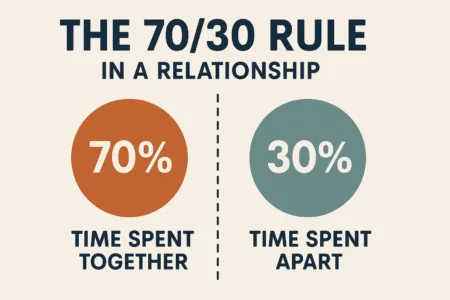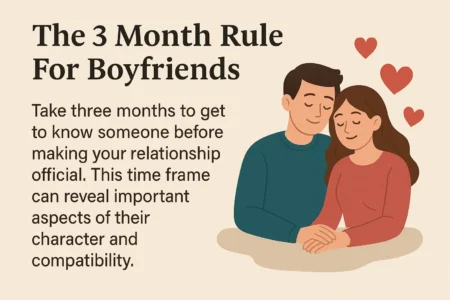Have you ever looked at the person sitting across from you—the one you’ve built a life with—and felt a chasm opening up between you? The silence is a physical weight. The inside jokes you once shared now hang in the air, unsaid. That connection, once as easy as breathing, suddenly feels a million miles away. It’s a profoundly lonely place to be, feeling so completely alone while sitting next to the one person you’re supposed to be closest to. If that ache is familiar, you’ve probably found yourself wondering late at night how to reset a relationship.
Let’s be clear. A reset isn’t a magic wand. You can’t just erase the arguments or the hurt that’s settled in your bones. It’s about making a conscious, deliberate choice to stop the car, get out, and refuse to keep driving down the same dead-end road. It’s about turning to each other and finally admitting, “This isn’t us. This isn’t who we want to be.” It’s a chance to start fresh. Not from scratch, but from right here, with all the wisdom and the scars that have brought you to this point. You’re not trying to glue the old pieces back together; you’re forging something entirely new.
More in Connection & Dating Category
7 Obvious Signs He Doesn’t Like You
Key Takeaways
- A true reset isn’t about forgetting the past. It’s about leveraging everything you’ve been through to build a smarter, stronger future together.
- It all comes down to raw, terrifying honesty. If you’re not willing to be vulnerable, you’re just wallpapering over the cracks.
- This has to be a two-person job. One partner can’t do the heavy lifting for the both of you; it takes 100% commitment from each of you.
- You have to get to the root of the problem. Stop fighting about the dishes and figure out what the real fight is about.
- Remember that a relationship can’t just be hard work. Rebuilding the fun, the laughter, and the intimacy is just as vital as solving your problems.
Is It Even Possible to Start Over With the Same Person?
This is the big question, isn’t it? The one that keeps you up at night. When you’re caught in a painful loop, the idea of a fresh start can feel like a pipe dream. You know each other’s triggers like the back of your hand. You can predict the precise eye-roll that will turn a simple question into a week-long cold war. How in the world do you unlearn that?
You don’t. You don’t erase it.
A relationship reset isn’t about playing pretend, acting like strangers meeting for the first time. It’s about acknowledging who you both are right now—baggage, battle scars, and all—and deciding to consciously create a new way of being together. It is an active commitment to stop playing your part in the old, destructive dance.
I remember a time a few years back when my partner, Mark, and I were in a deep freeze. Every single conversation felt like walking through a minefield. We were at each other’s throats about everything, from whose turn it was to empty the dishwasher to the huge, terrifying questions about our future.
One night, after a particularly nasty fight that dissolved into that familiar, crushing silence, I sat on the edge of our bed and had the thought: I don’t think we can come back from this. I knew the love was still there, somewhere, but it was buried so deep under layers of resentment that I couldn’t feel it anymore. The idea of a “reset” felt both ludicrous and like the only lifeline I could grasp. It meant admitting how broken we were, which was terrifying. But it also offered a sliver of hope, a path forward when I thought all roads were closed.
Before We Talk, What Do We Need to Agree On?
Diving headfirst into a soul-baring conversation without a plan is like sailing into a hurricane without a compass. You’re just going to get tossed around by the same old winds. So, before you start dissecting what went wrong, you have to agree on how you’re going to talk. This first step is everything.
How Do We Set the Ground Rules for a Healthy Conversation?
This isn’t a courtroom. You are not opposing counsels trying to win a case. You are partners on the same team, trying to solve a problem that is hurting you both. For that to happen, the conversation has to feel safe. It’s the only environment where real vulnerability can show up. So, before you get into the thick of it, agree on some basic rules of engagement. This isn’t about being robotic; it’s about being decent to each other.
You could make a simple pact: no raised voices. No interrupting. Absolutely no name-calling or dragging out that tired list of past grievances. The single most powerful tool you have is the “I” statement. Instead of “You never listen to me,” which is a guaranteed way to start a fight, try shifting the language: “I feel really hurt and invisible when I’m trying to share something and I see you on your phone.” See the difference? One is an accusation; the other is an expression of your own feeling, which is impossible to argue with.
And finally, agree on a safety valve. If things get too hot, if you feel that rage or overwhelming sadness taking over, either one of you can call a timeout. A 20-minute break to walk away, breathe, and get your head straight can mean the difference between a breakthrough and a breakdown.
Are We Both Actually Willing to Do the Work?
This one requires brutal honesty. A relationship reset is not a passive event. It is active, intentional, and frankly, exhausting work. It demands patience. It requires a deep well of empathy and a willingness to face some uncomfortable truths about yourself.
One person cannot do this alone. If you’re all in, ready to change and do the hard work, but your partner is just passively hoping things will get better on their own, you’re doomed. It won’t work.
Real commitment means listening without already building your rebuttal in your head. It means offering a real apology, one that doesn’t have the word “but” anywhere near it. It means being willing to try new ways of connecting that might feel weird at first. It means choosing the health of your relationship over the satisfaction of being right. You both have to be all in. If there’s even a hint of hesitation, that’s the first thing you need to talk about.
How Do We Figure Out Where We Went Wrong?
Okay. You’ve created a safe space to talk. Now the real work begins. This is where you have to move beyond the symptoms—the constant fighting, the lack of sex, the emotional void—and start digging for the real source of the illness. This takes genuine curiosity, a real desire to see the world from your partner’s side of the street, even when it feels foreign.
What Questions Should We Ask to Uncover the Real Issues?
The point here isn’t to figure out who’s to blame. The point is to understand. You’re both detectives, piecing together the story of your slow drift apart. Open-ended questions are your best tool. Avoid the accusatory “why did you…” and instead lean into “what” and “how.”
Take turns. One person speaks, and the other person’s only job is to listen. That’s it. No defending, no explaining, no trying to fix it. Just listen.
- “When did you first start to feel that distance between us?”
- “Can you tell me about a time recently when you felt totally alone, even though I was right there?”
- “What’s a core need you have that you feel I’m just not meeting right now?”
- “If you could wave a magic wand, what would a perfect day in our relationship look like?”
- “What’s something I used to do that made you feel really loved, that you miss?”
- “When you think about our future, what are you most afraid of?”
Answering these will require you both to be incredibly brave. It’s like slowly, gently peeling back the layers of armor you’ve been wearing for years. The answers might be painful to say and even more painful to hear, but this level of honesty is the only path to the core of the problem.
Is It About ‘The Fight’ or Something Deeper?
So many couples get stuck on what I call the “merry-go-round fight.” It’s the same argument, again and again, just wearing different clothes. Maybe it’s about money this week, chores the next, and the in-laws after that. You think you’re fighting about the dishes in the sink, but I promise you, it’s almost never about the dishes.
The dishes are just the symptom. The disease is the feeling buried underneath.
Mark and I had a classic merry-go-round about clutter. I’m a tidy person; he tends to leave a trail of chaos in his wake. For years, I would nag, he would get defensive, and we would have the same soul-crushing argument. I was convinced the problem was his messiness. But one night, when we were really trying to follow our new rules, I finally got to the truth. I broke down. “When I come home to a mess after a long day,” I admitted, “it makes me feel like you don’t respect me or the effort I put in. It makes me feel invisible.”
And he, in turn, was finally able to say, “When you’re constantly pointing out what I’ve done wrong, it makes me feel like a failure, like I can never make you happy.”
Boom. The fight was never about socks on the floor. It was about feeling respected and feeling valued. Once we saw that, we could stop arguing about the clutter and start healing the actual wound. Look for the pattern in your own recurring fights. What’s the feeling underneath it all? Is it about control? Feeling unheard? Unappreciated? That’s where you need to focus your energy.
We’ve Talked. Now What? How Do We Actually Change?
Talking is essential, but it’s just the beginning. An insight without a corresponding action is just a nice conversation. The really hard part of a relationship reset is turning those emotional breakthroughs into actual, tangible changes in how you behave every single day. This is where you start building your new foundation, brick by intentional brick.
Can We Create a ‘New’ Relationship Contract?
This might sound a bit formal, but it’s a game-changer. A “relationship contract” isn’t a legal document; it’s a shared promise. It’s your mutual agreement about the new rules of engagement. It’s a way of making your intentions crystal clear so there are no more gray areas or mistaken assumptions.
Sit down together and actually write it out. This is your new playbook. Frame everything in positive, actionable language. So, instead of “Don’t ignore me,” you write, “We commit to putting our phones away when we are talking to each other.”
Your contract might include things like:
- Communication: “We will have a 15-minute ‘check-in’ every night, with no distractions, to share one good thing and one hard thing from our day.”
- Conflict: “When things get heated, either of us can say the safe word ‘pause,’ and we will take a 30-minute break, no questions asked.”
- Connection: “We will plan a real date night, no phones allowed, every other Friday. We will take turns planning it.”
- Affection: “We will make a point to give each other one genuine compliment every single day.”
- Teamwork: “We will review who does what around the house once a month to make sure we both feel it’s fair.”
This document becomes your guide. When you feel yourselves slipping, you can go back to it as a concrete reminder of the promises you made to each other.
How Do We Break Old, Destructive Habits?
Old habits are notoriously hard to break, especially the ones baked into our relationships. Your brain has literally carved out pathways for these reactions. Your partner says X, and your brain instantly serves up response Y. To break that cycle, you need to be intentional. Psychologists call it “pattern interruption.”
A pattern interrupt is exactly what it sounds like: doing something completely different to stop a negative cycle in its tracks. The second you feel that old, familiar tension, that knot in your stomach that tells you the merry-go-round fight is about to start, you have to break the script.
It can be something serious or something completely absurd. You could agree that the first person to feel it coming on has to stop, go to the kitchen, and make tea for both of you. You could agree to step outside for ten minutes. You could even have a ridiculous safe word like “pineapple” that’s impossible to say with a straight face, instantly breaking the tension. The specific action is less important than the interruption itself. It forces a pause, giving you both a chance to breathe and re-engage from a calmer place.
How Do We Rebuild What We’ve Lost?
Fixing your communication and solving problems is like repairing the foundation and frame of a house. It’s essential, but it doesn’t make it a home. The final, and honestly, the most enjoyable part of a reset is actively rebuilding the trust, joy, and intimacy that have been worn away by the conflict.
What Does Rebuilding Trust Actually Look Like?
If trust in your relationship is broken—whether from one big betrayal or a thousand tiny cuts—it doesn’t come back in a single grand gesture. You can’t talk your way back to trust. It’s rebuilt with actions. Small, consistent, reliable actions, over and over and over again.
It’s about your word being gold. If you say you’ll be home at 6, you’re home at 6. Or you’re calling with a damn good reason why you’re not. It’s about transparency. It’s about doing what you said you would do in your new contract. Every single time you follow through, you add one tiny drop back into the well of trust. It’s a painfully slow process, but it is the only way. It requires endless patience from the person who broke the trust, and a willingness to eventually let go from the person who was hurt.
How Can We Start Having Fun Together Again?
When did your relationship become all about managing schedules, paying bills, and having “serious talks”? It’s so easy to forget that you’re supposed to actually like each other. Bringing fun and novelty back into your life together is non-negotiable if you want to reignite that spark. You have to create new, positive memories to start outweighing the bad ones.
Relationship psychology research backs this up. A well-known study from the State University of New York at Stony Brook found that couples who try new and exciting things together report much higher relationship satisfaction. Sharing a novel experience triggers the same dopamine rush in your brain that you had in the early, dizzying days of falling in love. It helps you remember the person you fell for.
This doesn’t mean you need to jump out of a plane. “New” is the key word, not “dangerous.”
- Take a cooking class for a type of food you both love but have never made.
- Find a local band and go see them play.
- Go to that weird little museum you’ve driven past a hundred times.
- Pick a random town on a map and go for a drive.
- Learn a new card game or try a sport like pickleball.
The goal is to shake yourselves out of your rut and see each other in a new context. It’s about laughing together. It’s about remembering how to be playmates, not just roommates.
How Do We Bring Back Physical Intimacy and Affection?
When you’re emotionally distant, physical intimacy is usually the first casualty. The thought of being physically close when you feel miles apart can seem forced, or even impossible. And the pressure to just jump back into having sex can make it even more fraught.
So, take all the pressure off. Start smaller. Go all the way back to the beginning of your relationship. It didn’t start with sex. It started with a hand on the small of the back, with holding hands, with a lingering hug. Go back there.
Make a conscious effort to reintroduce non-sexual touch into your daily life. Hold hands while you’re watching a movie. When you hug goodbye in the morning, make it a real, six-second hug (that’s how long it takes to release oxytocin, the bonding hormone). Touch their arm when you’re talking. Sit a little closer on the sofa. These small gestures rebuild a sense of safety and closeness. They are a quiet way of saying “I care about you” without the weight of expectation. As that emotional connection strengthens, you create a natural, safe path for sexual intimacy to return when you are both truly ready.
What If We Keep Messing Up?
The road back to each other is not a straight line. It’s messy. You will have bad days. You will fall back into old patterns because they are comfortable and familiar. You will have the same stupid fight you swore you’d never have again. This is not a failure. It’s proof that you’re human.
How Do We Handle Setbacks Without Giving Up?
What matters is what you do next. In the old days, a bad fight might have meant three days of silence. Now, you have new tools. A setback is a chance to practice. It’s an opportunity to stop and say, “Whoa. That was the old us. Let’s take a breath and try that again, using our rules.”
This is where grace comes in—grace for your partner when they slip up, and just as important, grace for yourself. Berating each other for not being perfect is a fast track to hopelessness. Instead, get curious. “What triggered that? Why did we go back to our old script? What can we do differently the next time that trigger comes up?” Every mistake is just data. The goal here isn’t perfection. It’s progress.
When Is It Time to Ask for Help from a Professional?
There is no shame in admitting you need a guide. You don’t have to navigate this wilderness alone. If you feel like you’re spinning your wheels, if the same core issues keep resurfacing no matter what you try, or if the resentment feels too heavy to lift on your own, it might be time to find a good couples therapist.
Going to therapy isn’t waving a white flag. It’s a sign that you value your relationship enough to invest in it. A therapist is a neutral third party, a trained professional who can see the patterns that you’re too close to notice. They can offer new tools and a safe space to have the really hard conversations. Think of them as a coach, bringing a new playbook when the old one just isn’t working anymore.
Choosing a New Beginning, Every Day
In the end, a relationship reset isn’t a single event. It’s a thousand small choices, made every day. It’s the choice to listen when you’d rather interrupt. The choice to be kind when you want to be right. The choice to put your phone down, to offer a small touch, to ask a question and actually hear the answer. It is the daily choice to see the person in front of you not as a collection of past hurts, but as your partner in creating a new future.
It is, without question, one of the hardest things you can ever choose to do. But it’s also an incredible gift. It’s the chance to build a love that is deeper and more resilient than you had before—a love that is not naive, but chosen. A love that has been tested, and has emerged, not perfect, but stronger and more honest for having been through the fire.
FAQ – How to Reset a Relationship

What actions help rebuild trust and bring back intimacy after a period of distance?
Rebuilding trust is a slow process of consistent, reliable actions—keeping promises, being transparent, and following through on commitments. To rekindle intimacy, small gestures like holding hands, hugging, and non-sexual touch help create a sense of safety and closeness, paving the way for physical intimacy to return.
Can a relationship really start over with the same person, and how do you unlearn old patterns?
Yes, a relationship can start over with the same person. It involves acknowledging who you both are now, including baggage and scars, and actively choosing to create a new way of being together. Unlearning old patterns requires intentional efforts like pattern interruption and new responses.
What are some key steps to creating a safe environment for discussion?
To create a safe environment, partners should agree on rules like no raised voices, no interrupting, and no name-calling. Using ‘I’ statements to express feelings and establishing a safety valve, such as taking breaks when tension rises, are crucial.
How important is honesty in the process of resetting a relationship?
Honesty is absolutely vital. A relationship reset requires raw, terrifying honesty where both partners are willing to be vulnerable and confront uncomfortable truths. This openness helps identify core issues and fosters genuine understanding.
What does it mean to reset a relationship, and is it about forgetting the past?
Resetting a relationship involves making a conscious decision to change the dynamic and build something new, leveraging past experiences rather than forgetting them. It means acknowledging the history, scars, and wisdom gained, and choosing to create a healthier way of being together.




